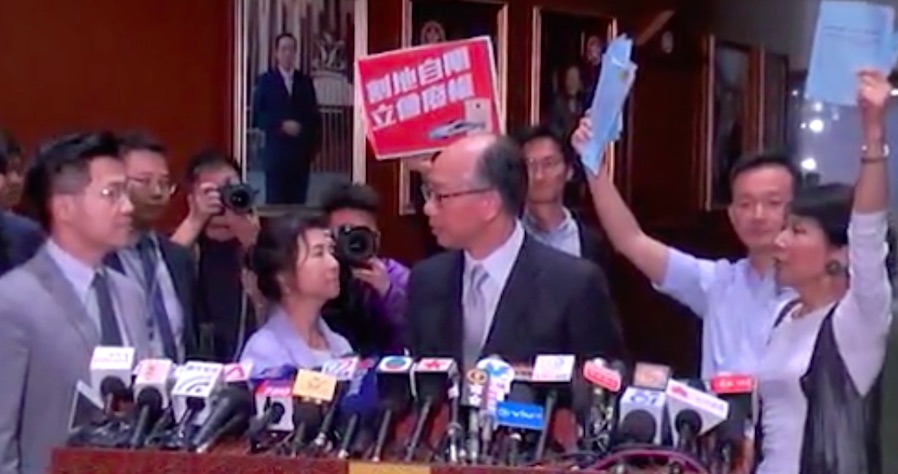Well, it happened. Hong Kong’s Legislative Council yesterday evening passed a controversial bill to allow mainland Chinese security officials to operate within a high-speed cross-border rail terminus in the heart of the city.
The “co-location” bill paves the way for joint-border checkpoint at Hong Kong’s West Kowloon Station to serve a high-speed link between the special administrative region and mainland Chinese cities, slated for completion in September.
Mainland customs and immigration personnel will have jurisdiction within the “special port area”, an arrangement the government has called “convenient” but critics have condemned as a breach of Hong Kong’s Basic Law, the city’s mini-constitution that guarantees its high-degree of autonomy from Beijing.
The bill’s passage, 40 votes to 20, with one abstention, follows a long and raucous debate, which has at times boiled over into chaos.
On Wednesday, police were called to the city’s Legislative Council, as five lawmakers from the pro-democracy camp, which opposes the plans, were carried out of the chamber. The fracas left two lawmakers and two security guards injured, according to local news reports.
Opponents argue the bill, which could still be subject to a judicial review, will set a precedent and “open the floodgates” for mainland laws to be enforced elsewhere in Hong Kong in the future.
“The underground area of the West Kowloon station will be carved out of Hong Kong territory,” Democratic Party lawmaker Helena Wong said during the debate yesterday, calling the bill an unsettling “magic trick” that would “turn the delineation of Hong Kong upside down”.
“After this bill is passed there will be a lot more problems that will follow.”
The bill is opposed by the Hong Kong Bar Association which called it an “irreparable breach” of the Basic Law.
Opposition, however, proved futile, as the pro-democracy camp lost their power of veto following a controversial ruling by China’s legislature, which saw six lawmakers ousted for improper oath taking.
Some 24 amendments proposed by the pan-dems — including a sunset clause and harsh punishments for mainland law enforcement officers who entered non-mainland areas — were shot down.
After the bill was passed, a group of pro-democracy lawmakers — Au Nok-Hin, Ray Chan, Eddie Chu and Claudia Mo — voiced their disproval as, outside the chamber, transport and housing secretary Frank Chan spoke to the press.
“Frank Chan shame on you,” Au shouted, as the group crowded behind the official.
“You said so yourself, you didn’t answer any of the lawmakers’ questions, you were the one who said you wanted to hear our thoughts.”
When Chan asked the group if they were done, Mo replied: “This is the Legislative Council, we are lawmakers, we have the right to stand here.”

During the debate, pro-Beijing lawmakers accused opponents of “scaremongering” and slammed pan-dems as “anti-China.”
The city’s leader Carrie Lam has called critics “irrational” saying the arrangement was on firm legal ground. She reiterated her support in a statement released after the vote.
The bill “provides a sound legal basis for the co-location arrangement, fully unleashing the transport, economic and social benefits of the XRL,” she said, referring to the express rail line by its acronym.
“The Guangzhou-Shenzhen-Hong Kong Express Rail Link (Co-location) Ordinance will be gazetted on June 22 and come into operation on a day to be appointed by the Secretary for Transport and Housing by notice published in the Gazette.”
First discussed almost two decades ago and officially named the Vibrant Express, the 140-kilometer rail line, connecting Hong Kong, Shenzhen and Guangzhou, is slated to open in September, following delays, cost overruns and technical issues for the HK$85.3 billion (US$10.7 billion) 26-kilometer Hong Kong section.
The controversy surrounding it has been linked to wider fears about interference by Beijing in Hong Kong affairs.
Critics have pointed to harsh prison sentences for political activists, the ousting of pro-democracy legislators for improper oaths of office, the kidnapping of Hong Kong booksellers, and a looming law carrying jail terms for “disrespecting” the Chinese national anthem as examples of threats to the city’s freedom.





Reader Interactions